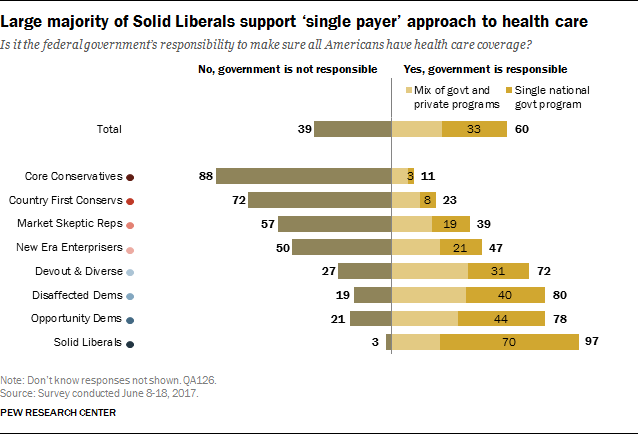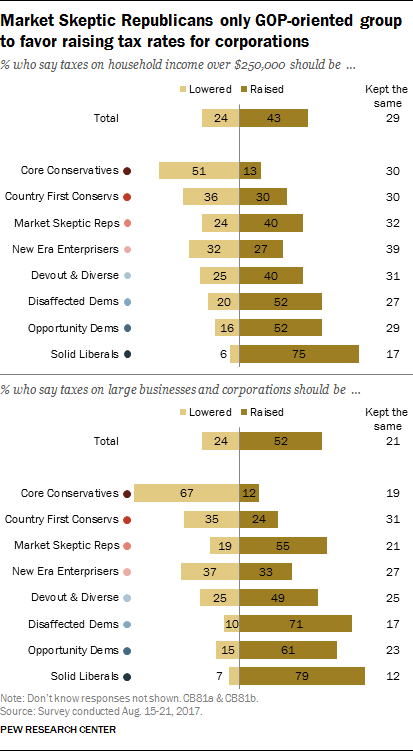Views of the economy and social safety net reflect the distinct profiles of the typology groups. Opinions differ among those with similar partisan leanings while still following the traditional, wide divides between the left and right.
While most Americans and typology groups see economic inequality as a problem, Core Conservatives express relatively low levels of concern about this issue. And while most Republican-oriented groups think the economic system is generally fair to most Americans, a large majority of Market Skeptic Republicans say it unfairly favors powerful interests.
On the Democratic side, there is disagreement over whether hard work leads to success for most people. Solid Liberals are broadly skeptical, but a large share of Opportunity Democrats think most people can get ahead if they’re willing to work hard.
Views of the social safety net prompt traditional partisan responses. Republican-leaning groups say the government can’t afford to do much more to help the needy, while Democratic-leaning groups say the government should do more for the needy even if it means going deeper into debt.
And when it comes to two areas of current political debate, taxes and health care, the views of the typology groups are nuanced. There are wide differences between groups on the basis on partisan affiliation, but there also are gaps within the two broader party coalitions when it comes to the best way to address the two issues.
Evaluations of the U.S. economic system
Among the public overall, there are widespread doubts about the fairness of the country’s economic system. About two-thirds (65%) say the economic system in this country unfairly favors powerful interests, while just 32% say the economic system is general fair to most Americans.
Democratic-oriented typology groups are especially likely to view the economic system as unfair. Fully 99% of Solid Liberals and Disaffected Democrats say the country’s economic system unfairly favors powerful interests. Two-thirds of Opportunity Democrats (67%) say this, as do a somewhat smaller majority (55%) of Devout and Diverse.
On the Republican side, 94% of Market Skeptic Republicans say the economic system unfairly favors the powerful. By contrast, most other Republican-oriented groups think the economic system in the country is generally fair to most people.
When asked about the issue of economic inequality, most Americans (82%) say it is either a very big problem (48%) or a moderately big problem (34%) in the country today. Relatively few say it is a small problem or not a problem at all.
There is disagreement among Republican-leaning typology groups in concerns about economic inequality. Just 8% of Core Conservatives think economic inequality is a very big problem, while another 37% think it is a moderately big problem. Clear majorities of all other Republican-leaning groups say economic inequality is at least a moderately big problem, including 86% of Market Skeptic Republicans.
Broad majorities of Democratic-oriented groups say economic inequality is a moderately big or very big problem. All Solid Liberals say inequality is at least a moderately big problem, including 84% who say it is a very big problem. Among Disaffected Democrats, far more also view economic inequality as a very big (66%) than moderately big (30%) problem.
Views of hard work and success
Despite widespread sentiment that the economic system is unfair, most Americans continue to believe in the ability of people to get ahead through hard work. About six-in-ten (61%) say most people who want to get ahead can make it if they’re willing to work hard; fewer (36%) say that hard work and determination are no guarantee of success for most people.
ahead through hard work. About six-in-ten (61%) say most people who want to get ahead can make it if they’re willing to work hard; fewer (36%) say that hard work and determination are no guarantee of success for most people.
On the left, Opportunity Democrats and Solid Liberals take very different views of whether success is possible through hard work. By 76% to 22%, Opportunity Democrats say that most people can get ahead if they are willing to work hard. This viewpoint sets them apart from the other Democratic groups.
A wide majority of Solid Liberals (73%) think hard work and determination are no guarantee of success for most people. Devout and Diverse and Disaffected Democrats, both financially strapped groups, are roughly divided in their views on hard work and success.
Roughly nine-in-ten Core Conservatives (94%) and New Era Enterprisers (90%) think most people can get ahead if they’re willing to work hard. Smaller majorities of Market Skeptic Republicans (65%) and Country First Conservatives (57%) say the same.
Divided views on the social safety net
Views on the social safety net follow a liberal-conservative pattern across the typology groups, with a wide gulf between the views of Core Conservative and Solid Liberals.
Overall, 85% of Solid Liberals say the government “should do more to help needy Americans, even if it means going deeper into debt.” Most Disaffected Democrats (72%), Opportunity Democrats (62%) and Devout and Diverse (62%) share this view.
Republican-oriented typology groups take the opposite view: 83% of Core Conservatives and 70% of Country First Conservatives say the government cannot afford to do much more to help the needy. Smaller majorities of Market Skeptic Republicans (58%) and New Era Enterprisers (59%) say the same.
Views on ‘zero-sum’ economic policies
Although the public has concerns about economic fairness and issues such as inequality, a narrow majority believes that it’s possible to have economic policies that benefit all Americans. Overall, 56% say “it’s possible to have economic policies that benefit everyone in the country,” while fewer (41%) think “pretty much any economic policy will end up benefiting some people at the expense of others.”
Across most typology groups, greater shares believe there are economic policies that can benefit all than say any policy will benefit some at the expense of others. And there’s rare agreement between Core Conservatives and Solid Liberals on this question: About six-in-ten among both groups say there are economic policies that can benefit everyone in the country.
Market Skeptic Republicans stand out from all other groups in their views. A majority (58%) says that pretty much any economic policy will end up benefiting some at the expense of others, compared with 41% who say it’s possible to have policies that benefit all. Along with their opinions on business and other economic issues, Market Skeptic Republicans’ view that economic policies are inherently unfair distinguish them from other Republican-oriented groups.
Divisions across typology groups in views of health care
Core Conservatives and Solid Liberals are poles apart on the question of the government’s role in health care, but this hot-button political issue also surfaces differences among the Republican-oriented groups. And while majorities of all Democratic-oriented groups think the government should make sure all Americans have health coverage, there are differences over whether the country should institute a “single-payer” system.
An overwhelming share of Core Conservatives (88%) say it is not the government’s responsibility to make sure all Americans have health care coverage. Most Country First Conservatives (72%) also take this position. A narrower 57% majority of Market Skeptic Republicans say it’s not the government’s responsibility to make sure all Americans have health care coverage. However, among the Republican-leaning New Era Enterprisers, about as many say it is not the government’s responsibility to ensure Americans have health care (50%) as say it is (47%).
Among the Democratic-oriented groups, about seven-in-ten or more say it is the government’s responsibility to make sure all Americans have health care coverage. But there are differences in views about the right approach for ensuring coverage.
Overall, 70% of Solid Liberals say it’s the government’s responsibility to make sure all Americans have health care coverage and that coverage should be provided through a single national health insurance system run by the government; fewer (24%) say government should ensure that all have health care, but that coverage should continue to be provided through a mix of private insurance companies and government programs.
By comparison, Opportunity Democrats are only somewhat more likely to support single payer over a mix of public and private programs (44% vs. 33%). Disaffected Democrats and Devout and Diverse say it’s the government’s responsibility to make sure all Americans have health care, but they are about evenly divided over the best approach for providing coverage.
Views on tax policy
A 43% plurality of the public says tax rates on household income over $250,000 should be raised. About a quarter (24%) say tax rates on this income should be lowered, while 29% say these rates on household income over $250,000 should be kept the same as they are now.
Views on taxes for large businesses and corporations are roughly similar to those on higher-income rates: 52% think tax rates on large businesses and corporations should be raised, while 24% think they should be lowered and 21% say they should stay the same.
Core Conservatives are more likely than all other groups to say there should be lower taxes on both on large businesses and corporations (67%) and household income over $250,000 (51%).
Market Skeptic Republicans, who widely say the economic system unfairly favors powerful interests, differ with the other right-leaning groups on tax policy. More say tax rates on high-earning households should be raised (40%) than say they should be kept the same (32%) or lowered (24%). And a 55% majority of Market Skeptic Republicans also says taxes on large businesses and corporations should be raised. Country First Conservatives and New Era Enterprisers are largely split in their views on tax rates for corporations and higher incomes, with fewer than 40% advocating any single approach to either question.
Large majorities of Solid Liberals think taxes should be raised on businesses and corporations (79%) as well as on household incomes over $250,000 (75%).
Among Devout and Diverse, Disaffected Democrats and Opportunity Democrats, greater shares say taxes should be raised than lowered on businesses and corporations as well as on household incomes over $250,000. However, slightly larger shares of all three groups support higher tax rates on large businesses and corporations than on household incomes over $250,000.
Most prioritize worker training in efforts to improve job situation
Wide majorities say the better way to improve the job situation in this country is “working to train people in the skills needed for jobs that are in demand” (81%) rather than “working to bring back or save the kinds of jobs that match the skills people already have” (16%).
The typology groups are largely in agreement on the better approach to improve the job situation. For example, large shares of Solid Liberals (95%) and Core Conservatives (80%) say the better way is to work to train people for in-demand jobs.
Country First Conservatives are the least likely to say this, though a majority still do: 62% say the better option is to train for in-demand jobs, while 30% say it’s better to work to bring back jobs that match current skills in the workforce.


 Find out which of the types is your best match
Find out which of the types is your best match Comparing Political Typology groups
Comparing Political Typology groups Facebook live: Political typology discussion
Facebook live: Political typology discussion